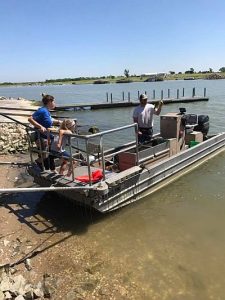Congratulations to the 2020-2021 Rural Voices Youth Contest winners!
 Avery Johnson, Beloit Jr. Sr. High School
Avery Johnson, Beloit Jr. Sr. High School- Carrie Roe, Herington High School
View the winning entries below.
About the Contest
The NCRPC sponsors the Rural Voices Youth Contest each year to engage high school seniors in North Central Kansas in thoughtful reflection on rural Kansas and to promote a discussion among citizens based on their insights. The 2020-2021 theme was “Rural Kansas…Tomorrow’s Possibilities.”
By Avery Johnson
By Carrie Roe
Rural Kansas — the best place to grow up. I am a fifth generation resident of the little town of Herington, which is located in the southeast corner of Dickinson County. I was born and raised in this railroad town of just 2,264 people, and I wouldn’t want it any other way. My dad grew up in Belleville, another small community in North Central Kansas, but my parents made the decision to live in Herington because they wanted us to build valuable relationships with extended family. My maternal grandparents own farmland that has been in the family for over 100 years, and it’s the pride they take in caring for this land that makes me want to raise my own family in rural Kansas.
The endless number of opportunities that are available in a small town are significant. When I was younger, I spent the majority of my time riding bikes with my siblings, swimming at my neighbor’s pool, and going to church with my family. The school bus stop was right outside my front door, so I’d talk with my friends before engaging in a full day of learning with my class of just 30 kids. Now, I’m able to represent Herington in all sports and extracurricular activities. My teachers know my name and my plans for the future, and help build me up to the person I need to be to reach my goals. Residents of Herington will see me mentioned in the local newspaper and never fail to congratulate me for my accomplishments on the volleyball court, for winning Homecoming Queen, or anything else far and in between. It’s blessings like these that just don’t come from a bigger town. Many people don’t understand that small town living is a hidden gem that needs to be discovered… Rural Kansas can become tomorrow’s possibilities, but will have to overcome challenges and setbacks to reach its full potential to thrive.
From the beginning of time, Herington has been a hub for a number of rail lines, including the Rock Island, Cotton Belt Route, Southern Pacific, and Union Pacific Railroads. The Union Pacific still uses Herington to this day. In recent years, Herington has begun to transform into a recreation destination, with numerous opportunities for fishing and camping at the Herington Lake, which covers 367 acres, and the Herington Reservoir, which covers 555 acres. The city also offers opportunities for hiking and horseback riding because we are in the western end of the Flint Hills Trail, a state park that stretches for 119 miles, from Osawatomie in the east to Herington in the west.
While all of these components of Herington are positives that we need to continue to build upon, there are definitely some struggles of living in a smaller farm town. For example, Herington is losing small businesses. My grandma remembers a movie theatre, skating rink, two grocery stores, lumber yards, pharmacies, and three banks. Now, however, we are just barely lucky enough to have a grocery store, two banks, a hospital, and a few hair salons. So many of our residents would rather take the 30 mile trip to Junction City to shop at Walmart, rather than walk down the street to shop locally. Without support from the citizens of Herington, our remaining small businesses will be forced to close. Another problem in Herington, as well as many other rural Kansas towns, is lack of income and job opportunities. Herington’s poverty rate is 23.47 percent. Many residents are born in the vicious cycle of poverty and aren’t quite sure how to work their way out of it. Citizens of smaller communities are in desperate need of a breath of new life, and here’s how to create it.
Strong communities are the lifeblood of Kansas. To build stronger towns, Community Development Programs sponsored by the Kansas Department of Commerce may be able to help rural areas with their businesses and main streets. Commercial rehabilitation grants help cities improve the quality of their downtown structures by assisting private property owners in the restoration of rundown buildings. The goal is that these grant funds will help prevent the spread of bad conditions to other nearby structures. Another program of the Kansas Department of Commerce is the Kansas Main Street program, which provides technical assistance and support for communities working on developing ways to revitalize and strengthen their downtown. It is centered around four points: economic vitality, design, promotion and organization. These strategies guide the local program toward a distinct vision of what they want their community to be. Per the Kansas Department of Commerce website, from 1985 to 2012, more than $600 million in redevelopment took place in participating Kansas communities. This included the opening or expansion of 3,800 small businesses, and creating more than 8,600 new jobs. With the return of the state program in 2020, 25 returning communities and new programs will be provided with the resources and tools they need to spark their potential. Another program sponsored by the state of Kansas has designated 77 counties as “Rural Opportunity Zones,” which means moving there brings a significant number of benefits. These designated counties offer new full-time residents state income tax waivers for up to five years and/or student loan repayments of up to $15,000 over a period of five years. I believe the state may need to expand this classification to more rural counties in an effort to bring the younger generation back to the heart of our state.
In correlation to these state programs, recently, my town has started a similar program called Herington Hearts that offers support to families in helping them build financial, emotional, and social resources as well as economic stability within the community. It has proven to be extremely beneficial thus far, and I believe a program similar to this would be beneficial for all rural communities that are desperate to decrease their poverty rate. These types of programs could offer a range of services to help communities in rural Kansas improve infrastructure, promote local businesses, preserve history, and enhance quality of life for those living in the farm towns of Kansas.
My vision for rural Kansas in ten years is one where people are proud to say they are from their tiny towns. We have many amazing communities in the area but I will always stand firm in my belief that rural towns are where families need to be raised. The values, morals, and work ethic that come from small town living makes admirable, hirable young adults. By 2030, I hope and pray for a thriving agricultural economy with happy residents and friendships that will last a lifetime. I strive for rural Kansas to have prospering businesses that fill the main streets and for poverty rates to be near zero. I am excited for the opportunity to raise my future children in a town similar to my own, so they can also experience the wonders of rural Kansas. I want them to know the feeling of being able to walk out the front door to hop on the school bus, and the pleasure of making real connections with their teachers, not just being a number in a database or a face in a crowd. These blessings don’t just come from everywhere… they do, however, come from rural Kansas — the best place to grow up.
Check back in Fall 2021 for details on the 2021-2022 Rural Voices Youth Contest.

 Congratulations to the 2019-2020 Rural Voices winners!
Congratulations to the 2019-2020 Rural Voices winners! Two high school seniors in North Central Kansas are being recognized with the John R. Cyr Rural Voices Award for submitting the top entries in the 2018-2019 Rural Voices Youth Contest.
Two high school seniors in North Central Kansas are being recognized with the John R. Cyr Rural Voices Award for submitting the top entries in the 2018-2019 Rural Voices Youth Contest.

 Congratulations to the 2016-2017
Congratulations to the 2016-2017  The NCRPC is once again offering the Rural Voices Youth Contest for high school seniors in North Central Kansas – marking ten years since the contest began.
The NCRPC is once again offering the Rural Voices Youth Contest for high school seniors in North Central Kansas – marking ten years since the contest began.